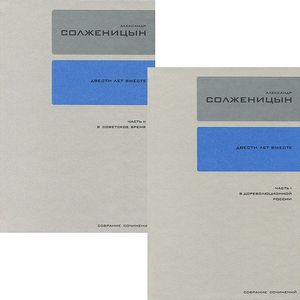Solzhenitsyn. Collected Works in 30 Volumes. Volume 26-27. Two Hundred Years Together (set of 2 books)
Please sign in so that we can notify you about a reply
In the 26th Tome of Writing Assembly, the first part of the study of two hundred years together (1795-1995) (for the first time: M.: Russian World, 2001), dedicated to the Russian-Jewish relations "in pre-revolutionary Russia". The author characterizes and analyzes the changed position of the Jews in the Russian Empire, allocating particularly important historical moments (the era of great reforms, the first Russian revolution, the First World War) Solzhenitsyn"s field of view includes the policies of the supreme power, the attitude towards the Jews of the Russian public, the role of Jews in the development of capitalism, their participation in the revolutionary movement, the beginning and distribution of Zionism in Russia, the tragedy of pogroms, the struggle for the abolition of settling features and other restrictive standards. The purpose of the study is formulated in the preface: "Search all points of a single understanding and all possible ways to the future, peeled from the bitterness of the past ... I sincerely try to understand both sides. To do this, immersed in the events, and not in controversy. I strive to show.
In the 27th volume of the Works, the second part of the study of two hundred years together is published (for the first time: M.: Russian World, 2002), dedicated to the Russian-Jewish relations "in Soviet times". Resolutely rejecting the myth of the revolution performed by the Jews, the author analyzes the participation of Jews in the events of 1917 and the Civil War (including in the ranks of the white movement) The "Jewish question" in the USSR is considered in close connection both with the common fate of the European Jewry in the 20th century and the disaster and the tragedy of Russia, which was under the rule of the Communists: a winding process of the assimilation of Jews in 1920-1930. And its consequences (including the growth of lower anti-Semitism), the fate of the Russian Jewishness in the first emigration, the Jews as the victims and the participants of the Communist Terror ("in the Gulag camps), the Jews" War with Germany". The post-war turn of Stalin to the policies of state anti-Semitism is considered in detail. In chapters 22-26, the peripetics of Russian-Jewish relations of the second half of the 1950s - early 1980s are traced, the outcome of the Jews from Russia, which began after the seven-day war (1967) In conclusion, the author reflects on the difficulties and paradoxes of Jewish assimilation, symbolicly completing the book by a quotation from the published in Israel (1981) "letters from Russia": I believe that it turned out to be on the ways of Russia - this contact of the soul of the Jewish and Soul Slavic, which was There is some kind of purpose "
In the 27th volume of the Works, the second part of the study of two hundred years together is published (for the first time: M.: Russian World, 2002), dedicated to the Russian-Jewish relations "in Soviet times". Resolutely rejecting the myth of the revolution performed by the Jews, the author analyzes the participation of Jews in the events of 1917 and the Civil War (including in the ranks of the white movement) The "Jewish question" in the USSR is considered in close connection both with the common fate of the European Jewry in the 20th century and the disaster and the tragedy of Russia, which was under the rule of the Communists: a winding process of the assimilation of Jews in 1920-1930. And its consequences (including the growth of lower anti-Semitism), the fate of the Russian Jewishness in the first emigration, the Jews as the victims and the participants of the Communist Terror ("in the Gulag camps), the Jews" War with Germany". The post-war turn of Stalin to the policies of state anti-Semitism is considered in detail. In chapters 22-26, the peripetics of Russian-Jewish relations of the second half of the 1950s - early 1980s are traced, the outcome of the Jews from Russia, which began after the seven-day war (1967) In conclusion, the author reflects on the difficulties and paradoxes of Jewish assimilation, symbolicly completing the book by a quotation from the published in Israel (1981) "letters from Russia": I believe that it turned out to be on the ways of Russia - this contact of the soul of the Jewish and Soul Slavic, which was There is some kind of purpose "
Author:
Author:Solzhenitsyn A.
Cover:
Cover:Hard
Category:
- Category:History & Geography
- Category:Romance & Love
ISBN:
ISBN:978-5-9691-1341-1
No reviews found
